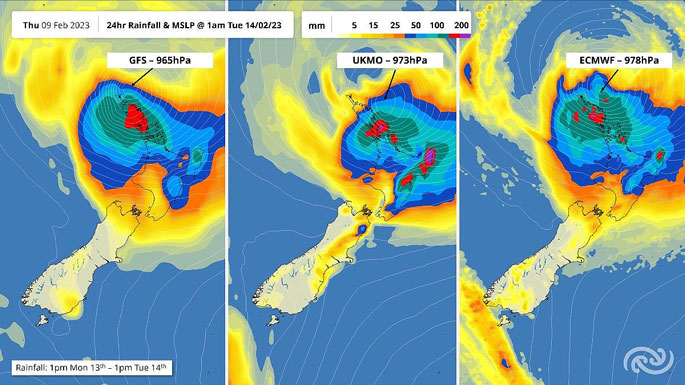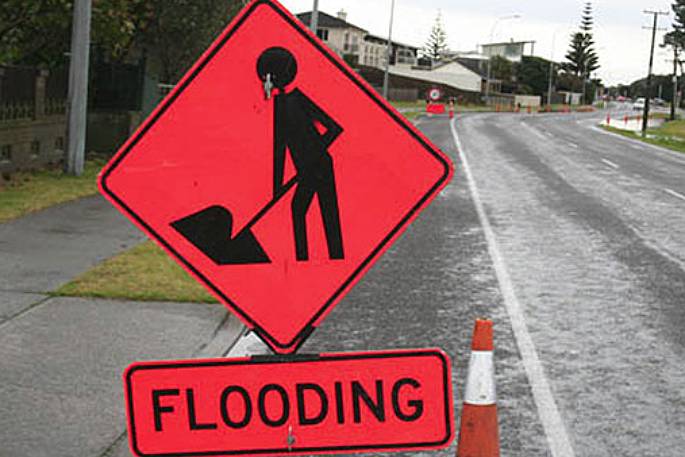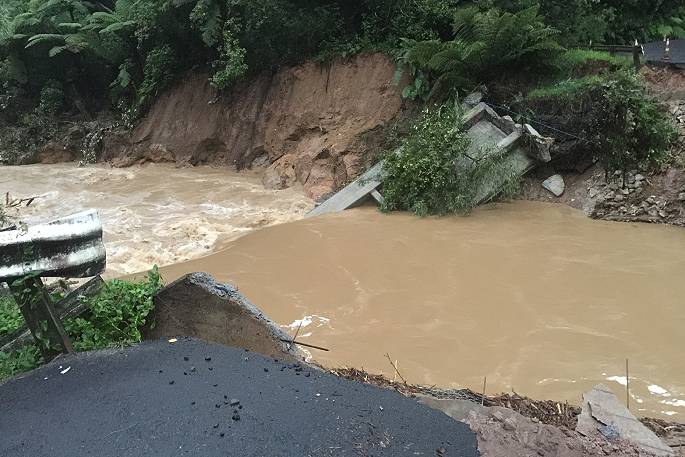People are being urged to start to prepare as Tropical Cyclone Gabrielle is likely to impact northern parts of New Zealand on Sunday.
'If the cyclone continues on its current path towards the north of New Zealand, we can expect this to be an extreme weather event with widespread damage,” says MetService head of weather communications Lisa Murray.
'Those areas that are already vulnerable following last week's weather are expected to see more rain, strong wind, heavy swells and coastal inundation which will exacerbate the situation.”
MetService has issued an early severe weather watch and are expecting these areas to be upgraded to warnings, and other areas added within the coming days.
There is nothing currently in place for the Tauranga and wider Bay of Plenty region.
'The time to prepare is now, making the most of Friday and Saturday's fine weather. Prepare yourselves for the worst and hope for the best."
GetReady.govt.nz has information regarding how to prepare for a storm.
Things like; make a plan, know where your nearest evacuation centre is, clear gutters and drains, secure lose structures like trampolines or heavy outdoor objects, secure boat moorings, look after livestock, etc.
'Northland, Auckland, Coromandel Peninsula and Bay of Plenty are still in clean up mode from the last event with debris still in the vicinity. This can become a hazard; blocking drains or being lifted by wind.
'Don't forget a cyclone brings severe damaging wind as well as heavy rain and swell. As the ground is already sodden trees are more likely to topple which could cause power outages.”
 Tropical Cyclone Gabrielle likely impact on New Zealand. Image: MetService.
Tropical Cyclone Gabrielle likely impact on New Zealand. Image: MetService.
Along with wind and rain, there will also be heavy swells for eastern areas and a storm surge of close to half a metre on top of the swell and wind waves.
Lisa says the path a cyclone takes is exceptionally hard to forecast, but there is agreement amongst the weather models that Cyclone Gabrielle will arrive in the north on Sunday.
'Even if the cyclone passes just offshore, there is still a high risk of significant and impactful weather over the upper North Island starting later Sunday, then spreading south to central New Zealand by Tuesday.”
Residents should make a plan
The mayors of Whangārei, Auckland and Thames-Coromandel District have all urged residents to start their preparations now.
With that advice in mind, it is a good idea to sit down with your family or flatmates and make a household emergency plan, the National Emergency Management Agency says.
It should cover topics such as contact details, a meeting place if you cannot get home, plans to pick up children from school, daycare etc and how to cope without water or power.
There is a template that can be downloaded here. Once it is finalised it can be printed out for sharing or emailed.
People should also have "a grab bag" packed with clothes, medications, phone chargers, cash, copies of important documents and photo ID and other items in case of evacuation.
 People are urged to check their drains to help prevent flooding in their areas.
People are urged to check their drains to help prevent flooding in their areas.
Tips when at home:
- Check your drains and spouting to ensure they are not blocked
- Have water for three days or more - make sure you have at least nine litres of water for every person. This will be enough for drinking and basic hygiene
- Have some long-lasting food that doesn't need cooking (unless you have a camping stove or gas barbecue) and food for babies and pets
- Have toilet paper and large plastic buckets for an emergency toilet
- Secure, or move inside, anything that could cause damage in strong winds
- Close windows and doors, close curtains to prevent injury from breaking windows
- Stay inside and bring your pets inside. If you have to leave, take them with you
- Check on your neighbours
- Listen to the radio and follow the instructions of emergency services
- Keep up to date with MetService weather forecasts
For possible travel
- Make sure your vehicle has fuel and have some emergency supplies in it too such as water, snacks and a change of clothes
- Avoid non-essential travel during severe weather and never drive through floodwaters
- If you do need to travel plan your route with live traffic and travel information from the Waka Kotahi website
At work
- Make sure you have supplies at work including sturdy walking shoes, a waterproof jacket, a torch, snack food and water
- Connect with those who live in the same area and see if you can join together to get home during an emergency
- For business owners or managers: find out what the risks are and how they can impact on your business - risks include natural hazards, health emergencies and utility failures
- If you have staff, talk to them about the risks they think are most relevant to your business
- Have a plan in place covering emergency procedures for each hazard, assembly points, and contact details for staff, suppliers, clients and insurance providers
- Plan for and talk to any disabled staff
- Study advice from Civil Defence that helps businesses plan for emergencies
The Get Ready website has comprehensive advice on helping households and businesses be as well prepared for adverse weather events as possible.
Local Civil Defence information will be issued by your local Civil Defence Emergency Management Group. To find yours, see here.
In an emergency, always call 111.
- Additional reporting by RNZ with information drawn from the Civil Defence, NEMA and MBIE websites



2 comments
Weather Event
Posted on 10-02-2023 13:27 | By Bob Landy
When did weather become a weather event?
@ Bob Landy
Posted on 10-02-2023 18:10 | By Yadick
During the 4 monthly 100yr event. Due to it being an event we'll probably get taxed on it by Labor soon.
Leave a Comment
You must be logged in to make a comment.